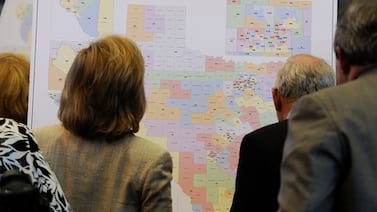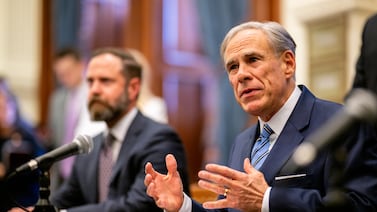Votebeat is a nonprofit news organization reporting on voting access and election administration across the U.S. Sign up for Votebeat Wisconsin’s free newsletter here.
Wisconsin election officials are alarmed by a request from onetime presidential candidate Robert Kennedy Jr. that may force them to apply stickers to cover up his name on millions of ballots, warning that it would be a big hassle to get the stickers on right, and could gum up the works on Election Day.
The Wisconsin Elections Commission turned down Kennedy’s bid on Aug. 27 to get his name removed from the ballot, citing a state law that says qualified nominees must appear on the ballot unless they die. But Kennedy has asked a court to order that his name be removed or covered up on the ballot with a sticker, a task that would have to be overseen by municipal clerks around the state.
That request is now before a conservative appeals court in Waukesha, and may end up before the Wisconsin Supreme Court, with fewer than seven weeks until the Nov. 5 election.
When he announced his withdrawal Aug. 23 and endorsed former President Donald Trump, Kennedy said he would seek to get his name removed in battleground states to avoid splitting Republican votes and aiding Democrats. He has succeeded in some states, and failed in others.
In Wisconsin, clerks have printed hundreds of thousands of ballots with Kennedy’s name, and have already sent out many of them to absentee voters.
Kennedy is asking for stickers only on the ballots that aren’t sent out yet. But covering them up with stickers could take 30 seconds apiece, an attorney for the Wisconsin Elections Commission said. That could amount to tens of thousands of working hours for local election officials across the state.
Attorneys for the commission also echoed concerns from many clerks who said Kennedy’s request could lead to significant ballot errors and voting machine malfunctions.
Requiring stickers would be a “logistical and administrative nightmare,” Wood County Clerk Trent Miner, a Republican, said in a court declaration. He said it could increase the likelihood of a tabulator misreading a ballot.
“With over 1,800 municipal clerks statewide, uniformity of any sticker placement becomes a real concern,” Miner said. “Errant sticker placement would produce an error and return the ballot to the voter, uncounted, again sowing distrust in the tabulation and administration of the election.”
Dane County Clerk Scott McDonell, a Democrat, said in a court declaration that malfunctions caused by the stickers “could cause significant delays in the counting of ballots and lead to possible disenfranchisement of multiple voters.”
Kennedy’s case ended up in the Waukesha appeals court after the Wisconsin Election Commission and a lower court rejected his request to be removed from the ballot. On Thursday, the commission asked the Wisconsin Supreme Court to take the case directly. That request is pending.
As the case moved forward, the appeals court asked representatives for Kennedy and the election commission on Wednesday: “Does it matter if ballots with stickers on them have not been tested with voting equipment?”
“No. It doesn’t matter,” attorneys for Kennedy responded. “We should presume this could be done.”
They added that the clerks were only speculating when they said stickers would cause problems because they haven’t tested it.
Sun Prairie Clerk Elena Hilby expressed alarm at the prospect of putting stickers on ballots without testing them first. “We would never send out any ballots that haven’t been tested, period,” Hilby told Votebeat. “Oh, my goodness, could you imagine counting by hand that night when we find out the tabulators can’t read it or something?”
As for processing a mix of ballots — some with stickers and some without — Hilby said, “That would scare me to have two different types of ballots out there and and know that my machines might react one way to one that doesn’t have a sticker and a different way to one that does have a sticker.”
Election Systems & Software, a big supplier of voting equipment in Wisconsin, said its machines in the state aren’t tested to handle large volumes of ballots with stickers on them, because federal guidelines don’t require such testing.
In fact, adhesive labels are not covered under ES&S warranties or service plans, said Katina Granger, ES&S senior public relations manager. Customers would be responsible for paying to fix equipment that malfunctions due to the use of stickers, Granger said.
Printed stickers have been used in some elections elsewhere in the country for write-in campaigns in the past, usually to keep voters from misspelling the candidates’ names, but in smaller volumes. Kennedy’s request would involve as many as 4 million ballots.
Clerks haven’t had the time to conduct any testing with stickers applied to ballots, Miner, the Wood County clerk, said in a court declaration.
Besides ballot errors, he said, “stickers could fall off, get stuck or jam up voting equipment creating unintended consequences from not being functional on [Election Day] to later requiring expensive maintenance and repair.”
“All it would take,” he continued, “is a small portion of the sticker to fall off in the scanner to render it unusable for the entirety of Election Day.”
Alexander Shur is a reporter for Votebeat based in Wisconsin. Contact Alexander at ashur@votebeat.org.




